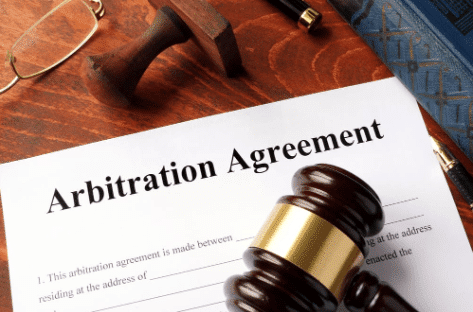Arbitration offers an alternative to resolving disputes outside of the courtroom, with an impartial arbitrator making informed decisions, particularly in credit card disputes. If you’re facing legal action over a debt, examining your credit card agreement for an arbitration clause is essential. By filing a Motion to Compel Arbitration, you can redirect the case away from litigation. To locate this clause, scrutinize the fine print, focus on dispute resolution terms, and leverage resources like the CFPB’s credit card agreement database.
Careful examination of your credit card agreement often reveals a mandatory binding arbitration clause, which, despite its brevity, carries significant implications for your legal standing.
What is an arbitration clause?
When you sign up for a credit card, you typically receive a credit card agreement detailing the terms and conditions of your card membership.
These agreements often include an arbitration clause, stipulating that any disputes between the parties listed in the contract must be resolved through arbitration rather than through litigation in court.
In essence, an arbitration clause mandates that both the creditor and the consumer address any potential disputes outside of the courtroom setting.
Find the arbitration clause in your credit card agreement
If you’re interested in locating the arbitration clause in your credit card agreement, here are some helpful tips.
Firstly, carefully read through the fine print of the credit card agreement. Arbitration clauses are often not prominently featured and may be tucked away within the pages of the agreement.
Secondly, you can typically identify the arbitration clause by searching for specific key terms or headers. Look out for sections labeled with headers such as:
- Dispute Resolution
- Legal Disputes
- Legal Recourse Options
- Claims Resolution
Third, use the Consumer Financial Protection Bureau’s credit card agreement database to find your agreement online. You can download the document as a pdf, then hit command+F and type in “arbitration” to quickly locate the arbitration clause and section. If nothing appears, then the credit card agreement most likely does not contain an arbitration clause.
Below is a typical arbitration clause example from the American Express Gold Card Cardmember Agreement:
“You or we may elect to resolve any claim by individual arbitration. Claims are decided by a neutral arbitrator.
If arbitration is chosen by any party, neither you nor we will have the right to litigate that claim in court or have a jury trial on that claim. Further, you and we will not have the right to participate in a representative capacity or as a member of any class pertaining to any claim subject to arbitration. Arbitration procedures are generally simpler than the rules that apply in court, and discovery is more limited. The arbitrator’s authority is limited to claims between you and us alone. Claims may not be joined or consolidated unless you and we agree in writing. An arbitration award and any judgment confirming it will apply only to the specific case and cannot be used in any other case except to enforce the award. The arbitrator’s decisions are as enforceable as any court order and are subject to very limited review by a court. Except as set forth below, the arbitrator’s decision will be final and binding. Other rights you or we would have in court may also not be available in arbitration.”
Check out this video to learn more about how to find an arbitration clause in your credit card agreement and how it can benefit you:
File a Motion to Compel Arbitration to push your case out of court
The prospect of facing a court battle over credit card debt can be daunting. However, if your credit card agreement includes an arbitration clause, you have the option to move the case out of court and into arbitration.
In arbitration, a neutral third party, known as an arbitrator, assesses the dispute and makes an informed decision. Arbitrators may be appointed by the court or selected jointly by both parties. They often possess expertise relevant to the dispute, such as technical or legal qualifications, and may include retired judges.
Typically, the responsibility for covering arbitration fees falls on creditors and debt collectors, which may incentivize them to resolve the matter swiftly. By filing a Motion to Compel Arbitration as part of your lawsuit, you can potentially gain an advantage over debt collectors and work towards resolving your financial situation.
It’s important to note that the arbitrator’s decision is legally binding, and except in specific circumstances, parties cannot contest it in court. For instance, if you engage in arbitration with CitiBank regarding a significant credit card dispute and are dissatisfied with the outcome, you generally cannot pursue the matter further in court.
Arbitration has its disadvantages
The significance of an arbitration clause lies in its ability to restrict your ability to bring a lawsuit against a credit card company in a traditional court setting, where public records, transcribed testimony, and evidentiary exhibits are standard. Additionally, a binding arbitration clause often prevents consumers from pursuing class-action lawsuits or similar collective actions.
Instead, such a clause mandates that any legal disputes be resolved through binding arbitration, a private and non-public process. Adding to the challenge, arbitrators who frequently handle disputes involving consumers and credit card companies often receive referrals from those same companies, potentially raising concerns about impartiality.
Under a mandatory binding arbitration clause, the financial institution typically retains the authority to choose the arbitrator. It’s worth noting that the selected arbitrator may not necessarily have legal qualifications, such as being an attorney or retired judge. Moreover, an arbitrator is not bound by conventional legal procedures, such as the Rules of Evidence or Civil Procedure, nor by legal precedent.
Since arbitration proceedings are conducted privately, arbitrators are not obligated to consider legal precedents when making their decisions. Additionally, there is usually limited recourse available if you disagree with the arbitrator’s ruling and wish to appeal.
Arbitration clauses are extremely common in credit card agreements
As of 2022, it’s challenging to find a credit card available to consumers that doesn’t include an arbitration clause. An analysis conducted by the Pew Charitable Trusts of 29 financial institutions revealed a significant increase in the reliance on mandatory binding arbitration clauses. In 2013, 59 percent of banks utilized these clauses, a figure that surged to a notable 72 percent by 2016.
Moreover, some financial institutions that had previously removed arbitration clauses from their credit card agreements have since reinstated them, offering limited options for consumers who prefer not to be bound by such restrictive legal provisions.
For instance, Chase Bank removed mandatory binding arbitration clauses from its credit card agreements in 2009 as part of a settlement to address a class-action lawsuit. However, in 2019, Chase Bank announced the reintroduction of forced mandatory arbitration clauses in the terms of service for many popular consumer credit cards. This decision was prompted by the expiration of the terms outlined in the earlier class-action settlement.
Arbitration clauses can also be found in other types of consumer agreements
Mandatory binding arbitration clauses extend beyond credit card agreements and are prevalent in various consumer contracts. These clauses are commonly found in agreements with companies like Amazon, Groupon, Netflix, and Verizon, indicating that consumers have likely consented to arbitration in the event of a legal dispute. Furthermore, they are frequently included in the fine print of terms for auto loans and leases, investment accounts, student loans, and even certain employment and nursing home agreements.
Arbitration clauses can prevent a consumer from filing a class-action lawsuit
Numerous legal challenges have been mounted against the use of mandatory binding arbitration clauses, largely contesting their restrictive impact on a consumer’s access to the justice system, particularly regarding the pursuit of class-action lawsuits.
One significant legal challenge reached the Supreme Court of the United States (SCOTUS) in 2013. In its ruling, the SCOTUS affirmed a company’s legal right to employ its arbitration agreement to halt class-action suits, even in cases involving alleged violations of federal antitrust laws.
Arbitration clauses don’t always benefit consumers
Public Citizen conducted an extensive analysis of nearly 34,000 arbitration cases filed with the National Arbitration Forum between 2003 and 2007, revealing concerning trends. Their findings indicated that creditors emerged victorious in nearly 94 percent of arbitration cases. What’s more troubling is that in over 80 percent of these cases, arbitrators based their decisions solely on documents provided by the business party, such as credit card companies or debt collectors.
In these “documents only” arbitration cases, the appointed arbitrators ruled in favor of the business party a staggering 99.99 percent of the time. This means that consumers prevailed in only 0.01 percent of such arbitration proceedings, highlighting significant disparities in outcomes.
The Consumer Financial Protection Bureau (CFPB) has also conducted an in-depth analysis of arbitration provisions in various consumer agreements. The federal agency reviewed thousands of documents and available court decisions.
According to research conducted by the Consumer Financial Protection Bureau (CFPB), mandatory binding arbitration agreements affect a significant number of consumers, many of whom may not have been aware of agreeing to such restrictions in their credit card or cable television contracts. Furthermore, the CFPB found no evidence to suggest that arbitration clauses lead to lower prices for consumers.
Therefore, before considering arbitration, it’s essential to be confident in the strength of your case and your chances of success with an arbitrator. Generally, arbitration cases initiated by consumers tend to yield better results. Many debt collectors may opt to drop a lawsuit rather than proceed with arbitration, which can involve fees exceeding the value of the debt in question.
What is ZumaZip?
ZumaZip is a convenient solution designed to streamline your response to a debt collection lawsuit. Here’s a breakdown of what you can expect when you use ZumaZip:
Firstly, you’ll access our user-friendly web application, which guides you through the process step by step. You’ll be prompted to answer a series of questions related to your specific situation. Once you’ve completed the questionnaire, you have the option to either print out the finalized forms and mail them to the appropriate courts yourself, or you can opt to utilize ZumaZip’s services to file them on your behalf. Additionally, if you choose this option, an attorney will review your document for added peace of mind.
If you’re seeking guidance on how to effectively respond to a debt collection lawsuit, ZumaZip can provide the assistance you need. Feel free to explore our FAQs for more information on what ZumaZip has to offer.
What if I haven’t been sued yet?
If you’ve only received a collections notice, but not a lawsuit, the best way to respond is with a Debt Validation Letter. When a debt collector contacts you in any way, whether it’s by phone or mail, you can respond by formally requesting a debt validation with a Debt Validation Letter . This letter notifies the collector that you dispute the debt and forces them to provide proof you owe the debt. They can’t call you or continue collecting until they provide validation of the debt. This flowchart shows how you can use a Debt Validation Letter to win.
Get started with a Debt Validation Letter here.
How to Answer a Summons for debt collection in all 50 states
Here’s a list of guides on how to respond to a debt collection lawsuit in each state:
- Alabama
- Alaska
- Arizona
- Arkansas
- California
- Colorado
- Connecticut
- Delaware
- Florida
- Georgia
- Hawaii
- Idaho
- Illinois
- Indiana
- Iowa
- Kansas
- Kentucky
- Louisiana
- Maine
- Maryland
- Massachusetts
- Michigan
- Minnesota
- Mississippi
- Missouri
- Montana
- Nebraska
- Nevada
- New Hampshire
- New Jersey
- New Mexico
- New York
- North Carolina
- North Dakota
- Ohio
- Oklahoma
- Oregon
- Pennsylvania
- Rhode Island
- South Carolina
- South Dakota
- Tennessee
- Texas
- Utah
- Vermont; Vermont (Small Claims court)
- Virginia
- Washington
- West Virginia
- Wisconsin
- Wyoming
Guides on how to beat every debt collector
Hey there! Facing off against a debt collector can feel like a daunting challenge, but fear not! We’re here to help you navigate through it all with our handy guides designed to assist you in beating every debt collector you encounter. Whether you’re facing a new lawsuit or dealing with a persistent collector, we’ve got your back. Stay positive, stay informed, and let’s tackle this together!
- Absolute Resolutions Investments LLC
- Accredited Collection Services
- Alliance One
- Amcol Clmbia
- American Recovery Service
- Asset Acceptance LLC
- Asset Recovery Solutions
- Associated Credit Services
- Autovest LLC
- Cach LLC
- Cavalry SPV I LLC
- Cerastes LLC
- Colinfobur
- Covington Credit
- Crown Asset Management
- CTC Debt Collector
- Cypress Financial Recoveries
- Delanor Kemper & Associates
- Eagle Loan of Ohio
- Educap
- Estate Information Services
- FIA Card Services
- Forster & Garbus
- Freshview Solutions
- Fulton Friedman & Gullace LLP
- Harvest Credit Management
- Howard Lee Schiff
- Hudson & Keyse LLC
- Integras Capital Recovery LLC
- Javitch Block
- Jefferson Capital Systems LLC
- LVNV Funding
- Mannbracken
- Mariner Finance
- Medicredit
- Michael J Adams PC
- Michael J Scott
- Midland Funding LLC
- Mullooly, Jeffrey, Rooney & Flynn
- Mountain Land Collections
- MRS Associates
- National Collegiate Trust
- Nationstar Foreclosure
- Northstar Capital Acquisition
- NCEP LLC
- NRC Collection Agency
- OneMain Financial
- Palisades Collection LLC
- Pallida LLC
- Paragon Revenue Group
- Pinnacle Collections Agency
- PMAB LLC
- Portfolio Recovery Associates
- Provest Law
- PYOD LLC
- Reunion Student Loan Finance Corporation
- Revenue Group
- Regents and Associates
- RSIEH
- Salander Enterprises LLC
- Second Round Sub LLC
- Security Credit Services
- Sherman Financial Group
- Suttell and Hammer
- T-Mobile
- Transworld Systems
- Tulsa Teachers Credit Union
- UCB Collection
- Velo Law Office
- Velocity Investments
- Waypoint Resource Group
- Weinberg and Associates
- Wolpoff & Abramson
Settle your medical debt
Having a health challenge is stressful, but dealing medical debt on top of it is overwhelming. Here are some resources on how to manage medical debt.
- Am I Responsible for My Spouse’s Medical Debt?
- Do I Need a Lawyer for Medical Bills?
- Do I Need a Lawyer to Fight Medical Bill Debt?
- Does Bankruptcy Clear Medical Debt?
- How Much Do Collection Agencies Pay for Medical Debt?
- How to Find Medical Debt Forgiveness Programs
- Is There a Statute of Limitations on Medical Bills?
- Medical Debt Statute of Limitations by State
- Summoned to Court for Medical Bills — What Do I Do?
- Summoned to Court for Medical Bills? What to Do Next
Stop calls from Debt Collectors
Do you keep getting calls from an unknown number, only to realize that it’s a debt collector on the other line? If you’ve been called by any of the following numbers, chances are you have collectors coming after you, and we’ll tell you how to stop them.
- 800-390-7584
- 800-289-8004
- 800-955-6600
- 877-366-0169
- 877-591-0747
- 800-278-2420
- 800-604-0064
- 800-846-6406
- 877-317-0948
- 888-899-4332
- 888-912-7925
- 202-367-9070
- 502-267-7522
Other wage garnishment resources
- Bank Account Garnishment and Liens in Texas
- Can I Stop Wage Garnishment?
- Can My Wife’s Bank Account Be Garnished for My Debt?
- Can Payday Loans Garnish Your Wages?
- Can pensions be garnished?
- Can Private Disability Payments Be Garnished?
- Can Social Security Disability Be Garnished?
- Can They Garnish Your Wages for Credit Card Debt?
- Can You Stop a Garnishment Once It Starts?
- Guide to Garnishment Limits by State
- How Can I Stop Wage Garnishments Immediately?
- How Long Before a Creditor Can Garnish Wages?
- How Long Does It Take to Get Garnished Wages Back?
- How to Fight a Wage Garnishment
- How to Prevent Wage Garnishment
- How to Stop a Garnishment
- How to Stop Social Security Wage Garnishment
- How to Stop Wage Garnishment — Everything You Need to Know
- New York Garnishment Laws – Overview
- Ohio Garnishment Laws — What They Say
- Wage Garnishment Lawyer
- What Is Wage Garnishment?
Guides on Arbitration
If the thought of going to court stresses you out, you’re not alone. Many Americans who are sued for credit card debt utilize a Motion to Compel Arbitration to push their case out of court and into arbitration.
Below are some resources on how to use an arbitration clause to your advantage and win a debt lawsuit.
- How Arbitration Works
- How to Find an Arbitration Clause in Your Credit Agreement
- How to Make a Motion to Compel Arbitration
- How to Make a Motion to Compel Arbitration in Florida
- How to Make a Motion to Compel Arbitration Without an Attorney
- How Credit Card Arbitration Works
- Motion to Compel Arbitration in California
- Sample Motion to Compel Arbitration
Federal Debt Collection Laws Can Protect You
Knowing your rights makes it easier to stand up for your rights. Below, we’ve compiled all our articles on federal debt collection laws that protect you from unfair practices.
- 15 USC 1692 Explained
- Does the Fair Credit Reporting Act Work in Florida?
- FDCPA Violations List
- How to File an FDCPA Complaint Against Your Debt Collector (Ultimate Guide)
- How to Make a Fair Debt Collection Practices Act Demand Letter
- How to Submit a Transunion Dispute
- How to Submit an Equifax Dispute
- How to Submit an Experian Dispute
- What Debt Collectors Cannot Do — FDCPA Explained
- What Does Account Information Disputed by Consumer Meets FCRA Requirements Mean?
- What does “meets FCRA requirements” mean?
- What does FCRA stand for?
- What is the Consumer Credit Protection Act
Resolve Your Debt with Your Creditor
Some creditors, banks, and lenders have an internal collections department. If they come after you for a debt, ZumaZip can still help you respond and resolve the debt. Here’s a list of guides on how to resolve debt with different creditors.
- American Express; American Express – Debt Collection
- Bank of America
- Barclay
- Best Buy Credit Card
- Capital One
- Chase
- Credit One Bank
- Old Navy Credit Card
- PayPal Synchrony Card
- Regional Finance
- Retailers National Bank
- Reunion Student Loan Finance Corporation
- SYNCB/PPEXTR
- Synchrony Bank
- Synchrony Walmart Card
- Target National Bank
- Webbank
- Wells Fargo
- Can I Pay My Original Creditor Instead of a Debt Collection Agency?
- Can I Settle a Debt with the Original Creditor?
Check the Status of Your Court Case
Don’t have time to go to your local courthouse to check the status of your case? We’ve created a guide on how to check the status of your case in every state, complete with online search tools and court directories.
- Alabama Court Case Search—Find Your Lawsuit
- Alaska Court Case Search — Find Your Lawsuit
- Arizona Court Case Search – Find Your Lawsuit
- Arkansas Court Case Search — Find Your Lawsuit
- California Court Case Search- Find Your Lawsuit
- Colorado Court Case Search — Find Your Lawsuit
- Connecticut Case Lookup — Find Your Court Case
- Delaware Court Case Search — Find Your Lawsuit
- Florida Court Case Search — Find Your Lawsuit
- Georgia Court Case Search — Find Your Lawsuit
- Hawaii Court Case Search — Find Your Lawsuit
- Idaho Court Case Search – Find Your Lawsuit
- Illinois Court Case Search — Find Your Lawsuit
- Indiana Court Case Search — Find Your Lawsuit
- Iowa Court Case Search — Find Your Lawsuit
- Kansas Court Case Search — Find Your Lawsuit
- Kentucky Court Case Search — Find Your Lawsuit
- Louisiana Court Case Search — Find Your Lawsuit
- Maine Court Case Search — Find Your Lawsuit
- Maryland Court Case Search — Find Your Lawsuit
- Massachusetts Court Case Search — Find Your Lawsuit
- Michigan Court Case Search — Find Your Lawsuit
- Minnesota Court Case Search — Find Your Lawsuit
- Mississippi Court Case Search — Find Your Lawsuit
- Missouri Court Case Search — Find Your Lawsuit
- Montana Court Case Search — Find Your Lawsuit
- Nebraska Court Case Search — Find Your Lawsuit
- Nevada Court Case Search — Find Your Lawsuit
- New Hampshire Court Case Search — Find Your Lawsuit
- New Jersey Court Case Search—Find Your Lawsuit
- New Mexico Court Case Search – Find Your Lawsuit
- New York Case Search — Find Your Lawsuit
- North Carolina Court Case Search — Find Your Lawsuit
- North Dakota Court Case Search — Find Your Lawsuit
- Ohio Court Case Search — Find Your Lawsuit
- Oklahoma Court Case Search — Find Your Lawsuit
- Oregon Court Case Search — Find Your Lawsuit
- Pennsylvania Court Case Search — Find Your Lawsuit
- Rhode Island Court Case Search — Find Your Lawsuit
- South Carolina Court Case Search — Find Your Lawsuit
- South Dakota Court Case Search — Find Your Lawsuit
- Tennessee Court Case Search — Find Your Lawsuit
- Texas Court Case Search — Find Your Lawsuit
- Utah Court Case Search — Find Your Lawsuit
- Vermont Court Case Search — Find Your Lawsuit
- Virginia Court Case Search — Find Your Lawsuit
- Washington Court Case Search — Find Your Lawsuit
- West Virginia Court Case Search — Find Your Lawsuit
- Wisconsin Court Case Search — Find Your Lawsuit
- Wyoming Court Case Search — Find Your Lawsuit






























